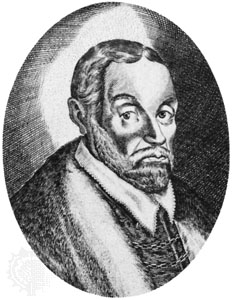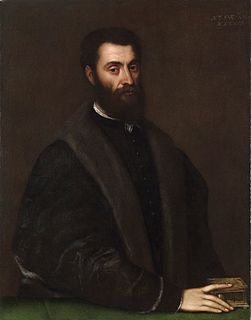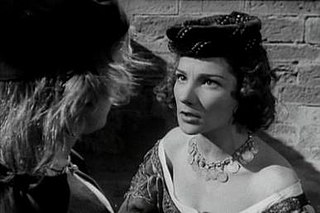
In Greek mythology, Canace was a daughter of Aeolus and Enarete, and lover of Poseidon. Her brothers were Athamas, Cretheus, Deioneus, Magnes, Perieres, Salmoneus and Sisyphus. Her sisters were Alcyone, Arne, Calyce, Peisidice, Perimede and Tanagra. With Poseidon, she was the mother of Aloeus, Epopeus, Hopleus, Nireus and Triopas.
This article contains information about the literary events and publications of 1573.
This article contains information about the literary events and publications of 1557.
This article contains information about the literary events and publications of 1546.
This article contains information about the literary events and publications of 1541.

Giovanni Battista Guarini was an Italian poet, dramatist, and diplomat.

Giovanni Battista Giraldi was an Italian novelist and poet. He appended the nickname Cinthio to his name and is commonly referred to by that name.

Decorum was a principle of classical rhetoric, poetry and theatrical theory concerning the fitness or otherwise of a style to a theatrical subject. The concept of decorum is also applied to prescribed limits of appropriate social behavior within set situations.

Brabantio is a character in William Shakespeare's Othello. He is a Venetian senator and the father of Desdemona. He has entertained Othello in his home countless times before the play opens, thus giving Othello and Desdemona opportunity to fall in love. He is furious upon learning they have eloped, and Desdemona's decision is reported to be the cause of his death in the last act. The character has no counterpart in Shakespeare's source material for the play and is apparently the Bard's complete invention. He appears in the first act only and is mentioned in the fifth.

Giovanni Placido Agostino Pascoli was an Italian poet, classical scholar and an emblematic figure of Italian literature in the late nineteenth century. He was, together with Gabriele D'Annunzio, the greatest Italian decadent poet.
French Renaissance literature is, for the purpose of this article, literature written in French from the French invasion of Italy in 1494 to 1600, or roughly the period from the reign of Charles VIII of France to the ascension of Henry IV of France to the throne. The reigns of Francis I and his son Henry II are generally considered the apex of the French Renaissance. After Henry II's unfortunate death in a joust, the country was ruled by his widow Catherine de' Medici and her sons Francis II, Charles IX and Henry III, and although the Renaissance continued to flourish, the French Wars of Religion between Huguenots and Catholics ravaged the country.

Sperone Speroni degli Alvarotti (1500–1588) was an Italian Renaissance humanist, scholar and dramatist. He was one of the central members of Padua's literary academy Accademia degli Infiammati and wrote on both moral and literary matters.
This article is an overview of the theatre of France.

Angelo Beolco, better known by the nickname Ruzzante or Ruzante, was an Venetian actor and playwright. He is famous for his rustic comedies, written mostly in the Paduan dialect of the Venetian language, featuring a peasant called "Ruzzante". Those plays paint a vivid picture of Paduan country life in the 16th century.

Emilia is a character in the tragedy Othello by William Shakespeare. The character's origin is traced to the 1565 tale, "Un capitano Moro" from Giovanni Battista Giraldi Cinthio's Gli Hecatommithi. There, the character is described as young and virtuous, is referred to simply as the ensign's wife, and becomes Desdemona's companion in Cyprus. In Shakespeare, she is named Emilia, is the wife of Othello's ensign, Iago, and is an attendant to Othello's wife, Desdemona. While considered a minor character in the drama, she has been portrayed by several notable actresses on film, with Joyce Redman receiving an Academy Award nomination for her performance.

Michael Cassio, or simply Cassio, is a fictional character in William Shakespeare's Othello. The source of the character is the 1565 tale "Un Capitano Moro" by Cinthio; Cassio is unnamed in Cinthio but referred to as "the squadron leader". In the play, Cassio is a young and handsome lieutenant under Othello's command who becomes one of Iago's several victims in a plot to ruin Othello.

Bianca is a fictional character in William Shakespeare's Othello (c. 1601–1604). She is Cassio's jealous lover. Despite her brief appearance on stage, Bianca plays a significant role in the progress of Iago's scheme to make Othello believe that his wife Desdemona is cheating on him with Cassio. Bianca is traditionally regarded as a courtesan, although this occupation is not specifically designated in the drama. The character was occasionally cut from performances in the 19th century on moral grounds. Bianca is not to be confused with Bianca Minola in Shakespeare's The Taming of the Shrew.
Orbecche is a tragedy written by Giovanni Battista Giraldi in 1541. It was the first modern tragedy written on classical principles, and along with Sperone Speroni's Canace, was responsible for a sixteenth-century theoretical debate on theater, especially with regards to decorum.

Giovanni Battista Niccolini was an Italian poet and playwright of the Italian unification movement or Risorgimento.











